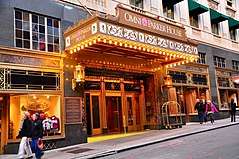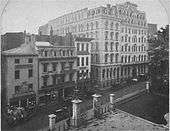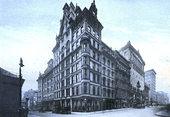Omni Parker House
Built in 1927, the Omni Parker House is a historic hotel in Boston, Massachusetts. The original Parker House Hotel opened on the site on October 8, 1855, making it until recently the longest continuously operating hotel in the United States. Additions and alterations were made to the original building starting only five years after its opening. Between 1866 and 1925, the hotel increased in size with new stories and additions, eventually expanding its footprint over 41,400 square feet of land—the bulk of the city lot bordered by Tremont, School, and Bosworth Streets and Chapman Place. Founder Harvey D. Parker ran the hotel until his death in 1884, when the business passed on to his partners. Subsequent proprietors of the Parker House were Edward O. Punchard and Joseph H. Beckman (1884–1891), Joseph Reed Whipple and the J. R. Whipple Corporation (1891–1933), Glenwood Sherrard (1933–1968), the Dunfey family (1968–1996), and Robert Rowling of TRT Holdings (1996–present).[1] Omni Parker House, Boston, is a member of Historic Hotels of America, the official program of the National Trust for Historic Preservation.[2] It is currently under study for becoming a Boston Landmark.[3]
| Omni Parker House Hotel | |
|---|---|
 Omni Parker House hotel in October 2010 | |
| Hotel chain | Omni Hotels |
| General information | |
| Location | Boston, Massachusetts |
| Address | 60 School Street |
| Opening | 1855 (original hotel), 1927 (current building) |
| Management | Omni Hotels |
| Other information | |
| Number of rooms | 551 |
| Website | |
| http://www.omnihotels.com/findahotel/bostonparkerhouse.aspx | |
History
19th century

Opened in 1855 by Harvey D. Parker and located on School Street near the corner of Tremont, not far from the seat of the Massachusetts state government, the hotel has long been a rendezvous for politicians.[4]
The hotel was home to the Saturday Club, which met on the fourth Saturday of every month, except during July, August, and September. Among the Saturday Club’s nineteenth-century members were poet, essayist, and preeminent transcendentalist Ralph Waldo Emerson, poet and The Atlantic Monthly editor James Russell Lowell, novelist Nathaniel Hawthorne, poets John Greenleaf Whittier and Henry Wadsworth Longfellow, diplomat Charles Francis Adams, historian Francis Parkman, and sage-about-town Dr. Oliver Wendell Holmes, Sr.[1]
Charles Dickens resided in the Parker House for five months in 1867–1868 in his own apartments; he first recited and performed "A Christmas Carol" for the Saturday Club at the Parker House, then again for the adoring public at nearby Tremont Temple.[5] The Parker House currently holds possession of the door to Dickens' guest room when he stayed in 1867 and the mirror used by him for rehearsals.
The hotel introduced to America what became known as the European Plan. Prior to that time, American hotels had included meals in the cost of a room, and offered them only at set times. The Parker House charged only for the room, with meals charged separately and offered whenever the guest chose.[4]
Actor John Wilkes Booth stayed at the hotel April 5–6, 1865, eight days before assassinating Abraham Lincoln. He was apparently in Boston to see his brother, actor Edwin Booth, who was performing there. While in Boston, Booth was seen practicing at a firing range near the Parker House.[1][4]
The Parker House created Massachusetts’ state dessert, Boston cream pie;[4] invented the Parker House roll; and coined the word "scrod," which is not a kind of fish, but a term for the freshest, finest, and youngest white fish of the day.[1]
Jacques Offenbach stayed at the hotel during an 1876 tour of the U.S., and, inspired by the rolls, sang a tune to friends as a joke. He would later use it as a theme in his opera, The Tales of Hoffmann.[4]
On May 31, 1884, when founder Harvey Parker died at the age of 79, he was buried in Mount Auburn Cemetery, the “permanent home” of many of Boston’s most prestigious people. The ambitious Maine farm boy who arrived in Boston almost penniless in 1825, died with a net worth of $1,272,546.94. Parker’s will granted $100,000 to Boston’s new Museum of Fine Arts, and provided the foundation for its Print Department.[1]
In 1891, J. Reed Whipple assumed control of the Parker House. To provide his Boston diners with the freshest and finest food products available, Whipple established his own 2,500-acre dairy farm in New Boston, New Hampshire. Valley View Farm was divided into Dairy, Piggery, and Hennery Departments, employing some ninety people. In order to make daily deliveries to Boston, Whipple helped build a railroad depot in New Boston and connected it to existing main lines with a spur track later leased to the Boston & Maine Railroad.[1]
20th century

The original Parker House building and later architectural additions were demolished in the mid 1920s, and replaced in 1927 with a sleek, modern building, essentially the one that stands there today. One wing of the nineteenth century hotel remained open until the new building was completed in 1927, enabling the hotel to lay claim to being "America's oldest operating hotel".[6]
James Michael Curley, the charismatic, Irish-American "Mayor of the Poor" who dominated Boston politics for the first half of the twentieth century, was a constant presence at the Parker House, in part because Old City Hall stood directly across from the hotel on School Street. The Omni Parker House bar, The Last Hurrah, was named for Edwin O'Connor's 1956 novel of the same name, a thinly disguised chronicling of Mayor Curley’s colorful life.[1]
John F. Kennedy announced his candidacy for Congress at the Parker House in 1946 and also held his bachelor party in the hotel's Press Room there in 1953.[4] Then Senator Kennedy also proposed to his future wife, Jackie Bouvier, at Table 40 in Parker's Restaurant located inside the Hotel.
The hotel was bought by Dunfey Hotels in 1968.[7] The Dunfeys rejuvenated and reinvented the Parker House as a historic/contemporary destination of choice and laid claim to its intellectual history. Inspired by the nineteenth-century Saturday Club, they founded the New England Circle in 1974, purposeful gatherings of activists from a variety of backgrounds and experiences designed to advance civil and civic dialogue and inspire constructive community change.[1] In 1983, that chain bought Omni Hotels and reorganized itself, with the Dunfey name phased out and the Parker House placed in the Omni division.[8]
21st century
The hotel currently has 551 rooms and suites.[9] In 2009, AAA named the hotel one of the top 10 historic U.S. hotels.[10] The Omni Parker House is a member of the National Trust for Historic Preservation's Historic Hotels of America program.
Famous workers
Ho Chi Minh worked as a baker at the hotel from 1912 to 1913. Malcolm X, then going by the name Malcolm Little, worked as a busboy at the hotel in the 1940s.[4] Long before he was a culinary superstar, Emeril Lagasse served as Sous Chef in the Parker kitchens from 1979 to 1981.[1]
In literature and music
For more than 150 years, the Parker House has appeared in prose and poetry set in and around Boston.
Edith Wharton included a private meeting between characters Mr. Newland Archer and Countess Ellen Olenska at the Parker House in her celebrated work of the early 20th century, The Age of Innocence.[11] Archer is told that the Countess Olenska is staying in Boston at the Parker House, and he flees Newport to meet her there.[12]
In Arthur Miller's 'Death of a Salesman' Willy Loman claims he 'met a salesman in the Parker House'. One imagines that as today a salesman would meet people in the public areas of such a grand hotel but stay, like Willy, at somewhere like the 'Standish Arms'.
Although many "haunting" books and "ghost tours" claim that Stephen King's 1999 short story 1408—about a writer who experiences a haunted stay at a New York hotel called the Dolphin—was based on Room 303 of the Parker House and the supernatural events surrounding the room, King's personal assistant says that claim is false.[1]
In March 1877, humorist Mark Twain was staying at the Parker House in room 168. A reporter from the Boston Globe entered Twain's room, shuttled in by a porter. After a pause of several moments, Twain swiveled around in his large easy chair and faced his visitor. With a local newspaper in hand and puffing on a large cigar, Twain observed to the reporter, "You see for yourself that I'm pretty near heaven—not theologically, of course, but by the hotel standard."[1] Twain's quote inspired the title for the definitive history of the Parker House, Heaven, By Hotel Standards, written by Susan Wilson and most recently published in 2019.[1]
In Donna Tartt's 1992 novel The Secret History, the characters stayed at the Parker House, mentioning it was where Dickens had stayed. In Anita Diamant's 2004 novel, The Boston Girl, the main character experiences a bad date at the Parker House.
The 2011 Grammy award-winning Parker Quartet, both founded and currently based in Boston, is named after the hotel.[13]
See also
- Harvey D. Parker (1805–1884), founder of the Parker House
References
- Wilson, Susan (2014). Heaven, By Hotel Standards: The History of the Omni Parker House. Boston, MA: The Omni Parker House. ISBN 978-0615934976.
- "Omni Parker House, Boston, a Historic Hotels of America member". Historic Hotels of America. Retrieved January 28, 2014. Cite journal requires
|journal=(help) - https://www.cityofboston.gov/images_documents/PETSTATS_June2016_tcm3-53570.pdf
- http://www.omnihotels.com/FindAHotel/~/media/Images/hotels/bospar/pdf/bospar_history%20book%20pages%20pdf.ashx Archived October 15, 2012, at the Wayback Machine
- Payne, Edward F. Dickens' Days in Boston: A Record of Daily Events. Cambridge, Massachusetts: Riverside, 1927, p. 231.
- "Boston's Literary Hotel". Retrieved 2009-10-07.
- "Once Dunfey-owned Omni Hotels Seek Bargains as Other Chains Divest Properties - Lane Memorial Library". www.hampton.lib.nh.us. Retrieved 11 June 2019.
- International Directory of Company Histories, 12, St. James Press, 1996
- "Hotel Suites in Boston - Omni Parker House". www.omnihotels.com. Retrieved 11 June 2019.
- "AAA Inspectors Pick Their Top Ten Historic Hotels for Independence Day". press release. American Automobile Association. 2009-06-23. Archived from the original on 2010-04-02. Retrieved 2009-06-25.
- Wharton, Edith (January 1997). The Age of Innocence (Dover Thrift Editions) (0800759298037): Edith Wharton: Books. ISBN 0486298035.
- Wharton, Age of Innocence, p. 147
- "Archived copy". Archived from the original on January 17, 2012. Retrieved February 14, 2011.CS1 maint: archived copy as title (link) CS1 maint: BOT: original-url status unknown (link)
External links
| Wikimedia Commons has media related to Parker House (Boston, Massachusetts). |
- Official Web site
- "Parker House (breakfast)". Menus. 1949 – via New York Public Library.
- Secrets of Beantown, from Auddissey Guides